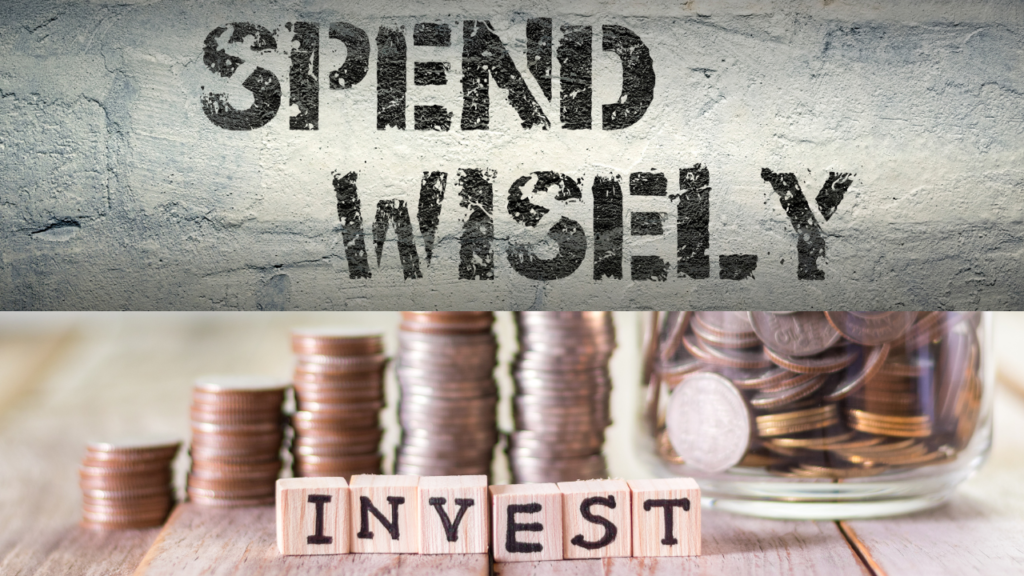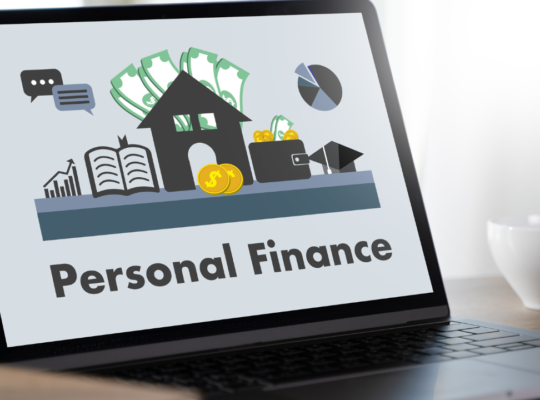
In this blog article, we will split our topic into two equal halves. One is to spend our money wisely and then to smartly invest the saved money.
It’s not a written rule that you should audit your choices and make decisions towards your financial health only during a New Year. A good financial plan always serves its purpose and never lets one go off the track in accomplishing the financial goals.
SPEND WISELY:
While some people struggle financially because they do not make enough money, many others struggle because they do not spend wisely, that is spending more money than they make. Wise spending is important because it allows you to live a stress-free life, by shielding you from hardship.
Basically, spending money wisely is spending money on things that matter to you the most. This helps you to save more money and allow you to achieve your financial goals. A good example of spending wisely is by using smart ways to save your money. This means that, you need to change a few habits and set goals for your finances.
Here are some steps to guide you on to how to spend money wisely:
Track Your Spending:

Before you can consider how to spend your money properly, you must first realize what you have been spending it on. As a result, the first step is to construct a budget to evaluate your earnings and expenditures. Once you have a clear view of where your money is going, you can figure out how to spend it more wisely. You may also utilise the envelope approach to spend your cash by labelling the envelopes “utilities,” “groceries,” “dining out,” and so on. No credit cards, checks, digital wallets, or anything else; only cash is to be used for spending.
Avoid Impulse Purchases:
If you want to be financially wise, you should avoid making impulse purchases. While planning your purchases is a good idea, buying something on the spur of the moment is a bad one.
Here are some pointers to help you prevent unplanned buying:
- Be cautious when window shopping. You could wind yourself purchasing something. When you lack self-control, you are more inclined to spend money on items that are not the best fit for you.
- Avoid making purchases if your judgement is compromised. Remember, simply a lack of sleep can impair your capacity to make sound judgements.
Plan your purchase:
Purchasing something only because you want to is frequently a poor financial option. Without adequate planning, making a purchase may inflate your expenditures and harm your financial wellbeing.
Do online research. When you embark on your ‘shopping adventure’, check online for the products you want to buy; look at the price they are offering and read the reviews of the item before committing to buying it online or in store.
Before you go shopping, make a list of what you need to buy. Take note of the costs at various retailers. Only when you are certain that you desire the item should you spend money on it. You will not only save money by doing this, but also time.
Please be careful of free stuff – According to research, grabbing and embracing free samples may persuade you to purchase the goods. A choice you may find yourself resenting later.
Identify Spending Habits:
When you’ve recorded your spending, it’s time to figure out which spending habits are emptying your budget. This might involve overspending on clothing, dining out frequently, or participating in costly hobbies. After you’ve identified the behaviours that are depleting your funds, you must assess whether or not these routines are essential.
It is not unusual to see people expend extravagantly in pursuit of impressing others and preserve an image. Many individuals desire to spend money to please others, whether it’s on a flashy automobile, fashionable apparel, or luxury things. Yet, this is a very unhealthy habit that might lead to eventual financial catastrophe.
Stay away from marketing tricks:
Outside forces have a significant impact on how we spend our money. Keep an eye out for all of the reasons you’re pulled to a product. Don’t make a purchase based only on advertising. Be sceptical of advertisements, whether it is on TV or on package design. They are intended to persuade you to spend more money and do not give a realistic representation of your alternatives.

Don’t buy something simply because it’s on sale. Discounts and deals are fantastic for items you were already intending to purchase. However, buying something merely because it’s on sale for 50% off doesn’t result in financial savings. Consider an item’s pricing on its own qualities, not because it is a “better value.”
Additionally, don’t just buy the mid-priced goods in a category without giving it some thought. Marketers understand that if they want you to buy a high-priced good or service rather than a low-priced item, they can sway your decision by including an absurdly expensive product, making the high-priced item appear intermediate in price and sensible in comparison to the incredibly expensive product. As a result, you are more likely to purchase the now mid-priced item, which is actually a high-priced product.
Better to pay in full:
Paying in full for the items or services you purchase will help you stay within your budget. If you want to be in charge of your own finances, paying in whole is always the preferable alternative. People overspend for a variety of reasons, including partial payment choices such as credit cards and 0% instalment plans for consumer products.
These partial payment solutions increase your spending appetite majorly for two reasons:
- Since this is an electronic transaction, when you buy anything, you don’t witness your money being handed over to the seller.
- Credit cards and 0% instalment plans such as ‘buy now pay later’ (BNPL) enable you to spend money that you do not now have. In other words, you’re spending money you might or might not have in the future.
Having credit cards and no real cash on hand makes purchasing items simple. The easiness of payment gives the impression that you haven’t spent anything, even if you have done some serious buying.
INVEST SMARTLY:
Now comes the ‘Invest Wisely’ portion of this blog article. Smart investing is an extension of fundamental investing ideas that comprises selecting the correct investment options to match your individual needs in order to help you reach your long-term financial objectives. Market volatility is an unavoidable element of the process. To earn excellent returns, you must invest on a consistent basis over a long time frame. As a result, it is critical to plan your money and time wisely as an investor.
These are some of the most effective techniques to invest wisely:
Keep yourself educated:

Although knowing the ABCs of investments is not required, it is recommended to understand the fundamental phrases so that you can make the best judgements. The repercussions of a hurried investment can be unpleasant and can result in the loss of your money or assets. Before venturing into the stock market, it is critical to first study the fundamentals. Knowing the internal workings of stock trading will assist you in making better financial judgements. In terms of other investments, stay up to date on new financial products and study investing books written by industry specialists. Even a broad understanding of financial events, combined with a dedicated habit of learning something new about investing every day, will benefit you over the long term.
Start investing early:
Hence, the earlier you begin investing, the longer your money will be able to grow. You can get an advantage by investing as soon as you start earning money. Even if you’ve already passed that moment in your life, it’s better late than never. Early investments can ensure that your money has ample time to develop into a sizeable corpus fund that will benefit you when you need it or when you decide to retire. Investing in quality companies that will multiply the worth of your investments over time is always the smartest approach to use your saved money, regardless of how young or old you are or how little you have.
Review your investments periodically:
It is critical to review your portfolio on a regular basis to examine the position with your assets, their advancements, and to keep an eye on your income. Over age, your investment portfolio varies in relation to your risk tolerance. You are young and have few liabilities, so you are receptive to high-risk, high-return ventures. In contrast, if you have a wide range of skills, you would most likely be wary of high-risk ventures in your later years. Organize all of your investments and assess their overall asset mix. Monitor the gains on your assets to see if they fulfil your expectations.
Set goals for your investments:

People sometimes make erroneous assumptions and are persuaded to invest in specific assets just because the prior years’ market returns were excellent. That, however, may not remain the case indefinitely. Outline your short- and long-term goals and modify them to your expected return. For example, for short-term goals, you may invest in fixed income instruments that provide modest returns, and for long-term goals, you might invest in stocks that provide larger returns.
Automate your savings:
Setting up automated monthly payments into your investment funds guarantees that you have enough cash flow for savings and investing. It is advantageous to automate as many processes as feasible in order to improve long-term outcomes. Investing in a pension scheme or term and health insurance from a young age is also part of automating your savings. Saving money automatically guarantees that your prejudices do not prevent you from pursuing such investments. It also ensures that you never miss or get behind on payments or insurance premiums. It also ensures that you have a defined limit on your expenditures and supports you in maintaining financial stability.
Invest regularly:
Market volatility is an unavoidable element of the game. To earn excellent returns, you must invest on a consistent basis over a lengthy period of time. At times, the market provides a sense of not providing high returns for an extended period of time. For example, the pandemic years have demonstrated the value of saving and its advantages in difficult times. Individuals should thereby create an emergency fund that can withstand a six-month loss of income. A little bit of financial preparedness may go a long way towards delivering a sense of tranquility.
Know the cost of investing:
Knowing the expenses of investing allows you to identify the factors that might lower your investment returns. Stock brokers frequently charge commissions, so for investors starting with a minor investment, a discount broker is typically the best choice because the fee they will charge is little, but note that mutual funds also charge an administrative fee.
Be Patient when it comes to investing:
Once again, we might take solace in a famous saying: “Good things do come to those who endure.” This proverb also applies to the financial sector or to be precise, to the investment world. Most investors seek quick gains. Unfortunately, such haste might result in substantial financial losses. Conversely, seeing investing as a long-term endeavor is far more advantageous since good gains take time to develop.
Have an Emergency Plan:

A wise investment also includes developing robust emergency preparations. A sound insurance strategy and a reliable life insurance policy are essential tools for ensuring financial security. When selecting a life insurance policy, choose one with a higher age limit since this is the safest bet. Also, while selecting health insurance, be sure it covers essential illnesses and includes family coverage as well.
Conclusion:
To summarize, the first step towards getting your finances in order is to learn how to spend money intelligently. Essentially, this allows you to see where the majority of your money has been going and re-evaluate each of your spending patterns. When you’ve evaluated your spending habits, you may move on to the investment section of your long-term financial strategy. Before diving into typical investing instruments, start with savings. The trick is to create and carry out a plan to invest wisely.





